How to create an innovation powerhouse — Interview with Dr Dennis Gross
Olaplex Bond Building Treatment.
SKII Facial Treatment Essence.
Supergoop Suncreen.
Every so often a beauty brand launches a product that becomes a cult favorite based on innovative results. What’s less common are companies with multiple new-to-the-world innovations. Innovation is hard. Doing it twice is harder.
Nevertheless, cult-skincare brand Dr. Dennis Gross not only has a hero product (their Alpha Beta daily peel) but the brand regularly releases new-to-the-world ‘breakthrough’ innovations. In the past year, Dr. Dennis Gross skincare has been on an innovation tear, launching the Repair Serum (designed to mimic the impact of injectables — no needles needed), their Lactic Acid Vitamin C line (designed to combat sun damage and free radicals), and of course, the latest lip launch — featuring an FDA approved LED treatment and a Lip Plump volumizer gloss product that plumps lips without filler.
How do they do it?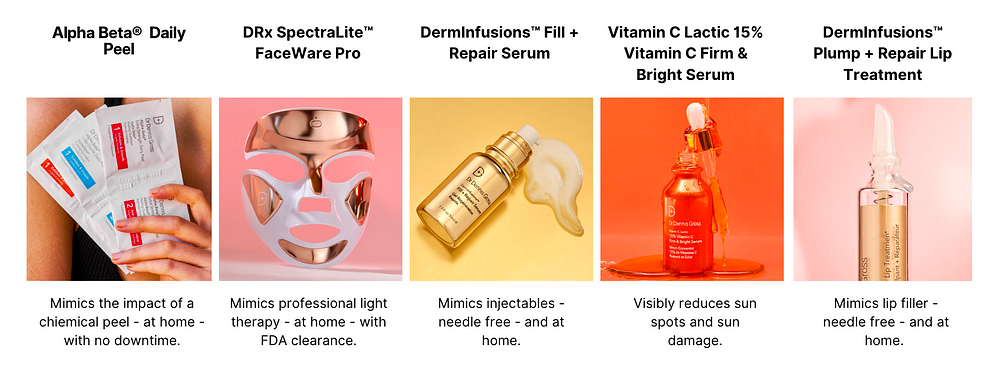 A few of Dr Dennis Gross innovations (Source: Dr. Dennis Gross skincare)
A few of Dr Dennis Gross innovations (Source: Dr. Dennis Gross skincare)
On the launch day for the new lip products, I got the opportunity to sit down and interview Dr. Gross.
My question: how are they out-innovating brands with 10x the R&D budget? Dr Dennis Gross at last weeks Lip Plump launch (Source: Michelle Wiles)
Dr Dennis Gross at last weeks Lip Plump launch (Source: Michelle Wiles)
Creating an innovation machine: Takeaways from Dr. Dennis Gross
From the start of my conversation with Dr. Gross it was clear that he thinks about his company very differently than your typical brand. For one, he did not refer to Dennis Gross Skincare as a brand, or even as a company. Rather, he referenced it as a think tank. I love this reframing because think tanks are primary research organizations. They do not just report on trends; they find the trend before it’s a trend. In the case of Dennis Gross Skincare, they even create the trends.
And that’s exactly how Dr. Gross has organized his company:
There are people who we have in the company whose strength is to see what would be a great next new thing. And then my team is tasked to develop that.
— Dr. Dennis Gross
To do this, Dr. Gross noted the difference between insight (the ability to interpret and respond to the present) and foresight (the ability to predict and prepare for the future), with a clear research focus on the latter:
The whole idea is to see a trend before it trends. And I think that is that’s a great skill set of the people in the company.
— Dr. Dennis Gross
By setting the research bar high, Dr. Gross ensures that his team is not copying others with me-too products (oh, such-and-such brand has this kind of cream, we should launch one as well). Instead, they only release products on the forefront of innovation. Of course, it would be great if we all had a crystal ball of what customers want that is also not yet on the market.
How do you actually generate this foresight?
To enhance discovery of new innovations, Dr Dennis Gross engineers foresight into their company.
The most obvious source of foresight is Dr. Gross’s dermatology practice. Dr. Gross is still a practicing dermatologist in NYC, which means customer research isn’t an activity that happens only when the company is in product development mode. Instead, customer input is embedded into their model:
I am still seeing patients on a regular full-time basis, and I think that my patients are a cross section of the consumer… We survey them, we listen to them. And that serves as a springboard for development of whitespace products.
— Dr. Dennis Gross
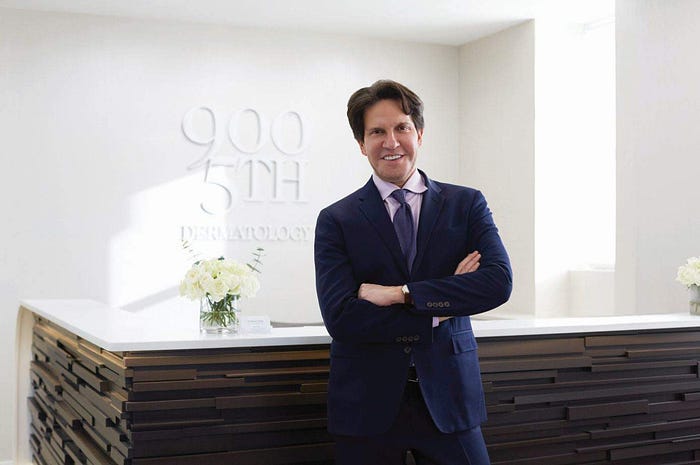 Dr. Dennis Gross at his Upper East Side practice. Source: Elite Traveler
Dr. Dennis Gross at his Upper East Side practice. Source: Elite Traveler
Engineering foresight: Culture first
The other part of Dennis Gross Skincare’s foresight model is how the Gross’s run their company internally. Per Dr. Gross, scientific breakthroughs and creativity go hand and hand. But creativity does not happen in a silo. It requires disparate ideas coming together. The Gross’ (Dr Dennis Gross and his wife Carrie, CEO of Dr. Dennis Gross Skincare) facilitate creative interactions by getting different departments to talk each other. Or, rather, by not having departments at all:
What is creativity? Creativity is the synthesis of different ideas. And it happens in a moment. Those moments have to be done by having creative people work together. My advice is to create a company where you don’t have independent departments.
— Dr. Dennis Gross
Dr. Gross also brought up their hiring practices. Innovation and creativity is a core skill that the company prioritizes:
When we hire we look for people who have creativity, innovation as a major feature in the way they think, and then [we] bring them together…it’s a process you know, it’s collaboration and it’s creativity, and [that results in] seeing things sooner than average.
— Dr. Dennis Gross
Now, focusing on company culture, fostering creativity — these are common refrains from leaders positioning their company as a great place to work. But with Dr. Gross — it’s genuine. Case in point — after we wrapped up the interview, I got to receive my own lip treatment. As I am sitting in the chair, lip plump on, Dr. Gross came rushing back.
Dr. Gross: I remember, I didn’t tell you one thing.
Me, trying not to mess up the treatment: Mm?
Dr. Gross: You’ve got to create an environment within your company where people feel comfortable to talk. That’s a huge thing. Some people are shy. Some people are, you know, they’re sitting with the VP of Marketing, and they’re two levels below…it’s important that you are able to elicit advice and comments from everybody [in those moments] because you can use a lot of valuable input. Science is what we do as a company. But back to the question of how you do it, it’s a think tank kind of thing where everyone has a feel and a place at the table.
If that’s not an ad for working there, I don’t know what is.
Marketing breakthrough innovations: Education over selling
To be fair, Dr Dennis Gross is not the only brand launching innovative skincare products. But his team has done one of the best jobs of bringing dermatology-inspired products to the masses and driving their adoption among previously unaware consumers.
How do they do it?
The company relies on education as a marketing strategy. Which makes perfect sense. For innovative products like Dr Dennis Gross at-home peels, or his new lip device, he needs to show customers why they should add this to their regimen.
At the lip event, Dr. Gross led a presentation on the science of the new products, showing journalists each element of the science behind the innovation. I felt like I was back in class. Probably because I was.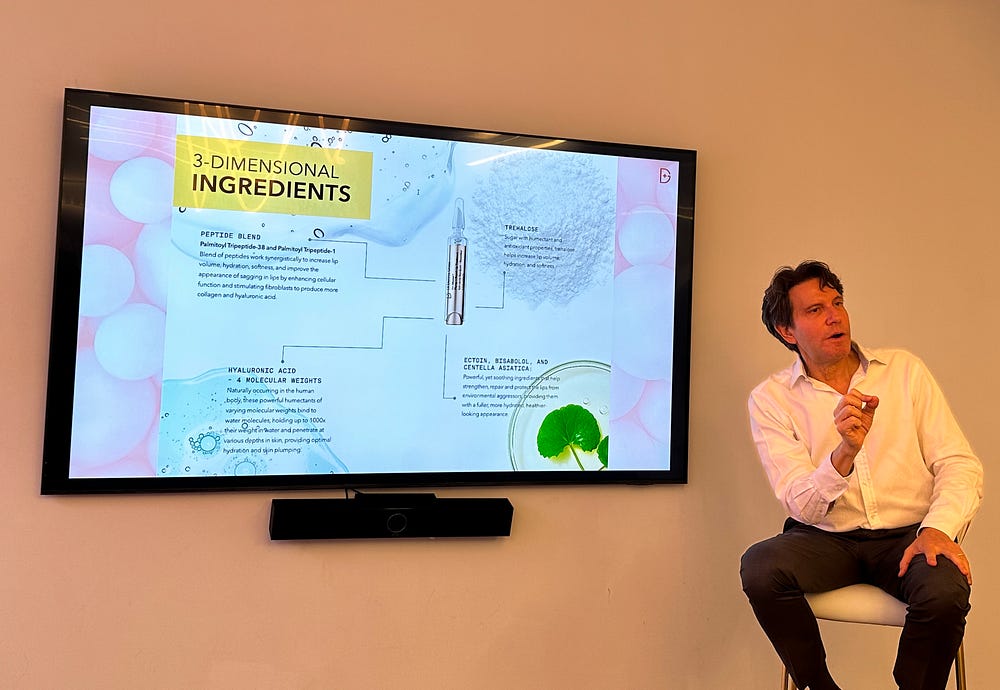 Dr Dennis Gross explaining the science behind their DermInfusions™ Plump + Repair Lip Treatment at last week’s launch
Dr Dennis Gross explaining the science behind their DermInfusions™ Plump + Repair Lip Treatment at last week’s launch
I sat down with him immediately after this presentation.
Me: I feel like in another life you’d be a professor.
Dr. Gross: That’s what I want to be in this life. My motto is don’t sell, educate. That’s the whole company.
If you look at Dr. Dennis Gross’ marketing, you see a premium on education. Dr. Gross’s Youtube features educational series like ‘Ask the Derm’ and Masterclasses on the science of skincare.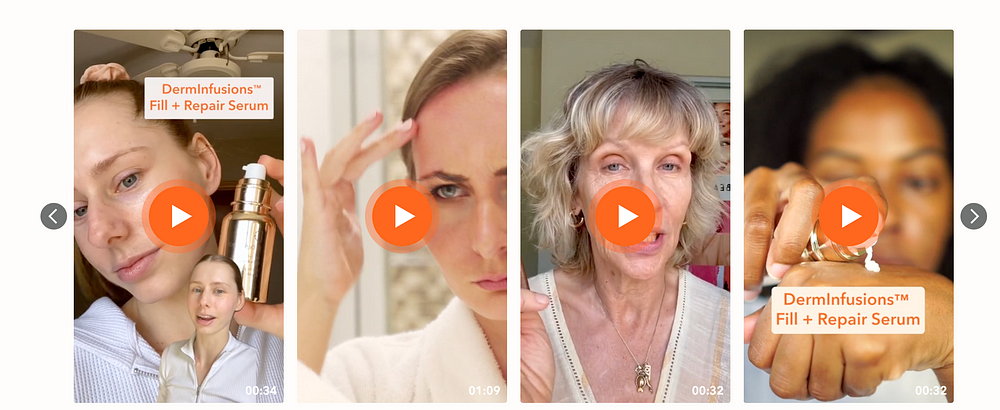 Each Dr Dennis Gross product page has a series of videos explaining how real people use the product. Source: drdennisgross.com
Each Dr Dennis Gross product page has a series of videos explaining how real people use the product. Source: drdennisgross.com
You see this with big brands, too. Every Apple product launch starts with an hours long presentation explaining the new technology and just why you need to be spending your next paycheck on their new-to-the-world innovation. Dr. Dennis Gross takes that model and translates it to skincare.
Crafting the innovation machine:
The biggest takeaway from my conversation with Dr. Dennis Gross is that running an innovation-first company requires designing for innovation at every step of the product lifecycle. Breaking down silos, hiring for creativity, and embedding customer research into operations drive foresight and product creation, while education-focused marketing help these innovations gain traction on the market.
As a consultant, I can’t help but put this into a new model 🤓— comparing the research, operations, and marketing of Innovation-focused brands (e.g. those launching a new-to-the-world innovations) vs Fast-Follower brands (e.g. a company launching a new slick sunscreen to compete with Supergoop’s success). I want to be clear — both models can very profitable and good for consumers. And many companies do both.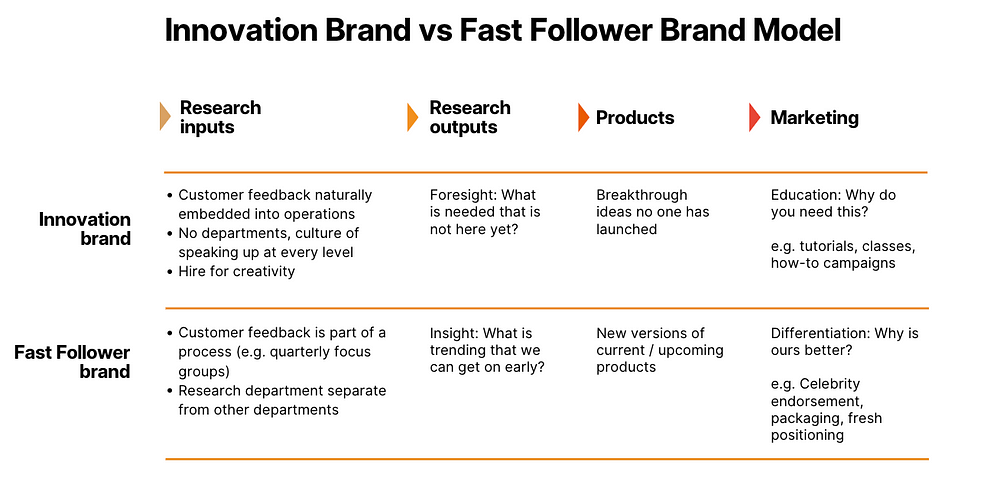 Innovation vs Fast Follower model. Source: Michelle Wiles
Innovation vs Fast Follower model. Source: Michelle Wiles
What do you think of the innovation brand vs fast follower model?
And, what are your thoughts on of Dr Dennis Gross’ innovation philosophy? Tell me in the comments!
What about the new lip treatment?
I will say (with as little bias as possible!) the new lip products are fantastic. The LED product is tough to evaluate as it’s the kind of product to take a couple of weeks to see results from. But the new lip gloss product immediately made my lips look fuller and more colored — and I’ve already given it prime placement my handbag for touch ups during the day.
Final thoughts
The last question I asked Dr. Gross was what advice he has for entrepreneurs looking to launch their own brand. His answer? Work on your product until you have something truly innovative. And then, stay confident. If your product is truly breakthrough, it will succeed:
“I funded [Dr Dennis Gross] completely independently. I had kids, I was a practicing dermatologist. But I created this product, and I knew it worked and what gave me the guts to invest and take a chance was the fact that I knew there was nothing like it in terms of results… I wasn’t afraid of failing because all I needed was to get it in the hands of enough people to prove it… You’ve got to be different. You’ve got to be better. And then it will take care of itself. It just does.”
Don’t miss out on brand insights — Sign up for monthly emails on brand marketing.
Looking for help growing your brand?
I run brand consultancy Embedded — where I partner with companies on growth and brand strategy.
Not sure where to start? Many clients opt for ad-hoc coaching — hourly consultations on any aspect of your marketing and brand strategy. Get in touch here.
If you liked this piece, you might like:





































































